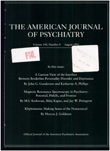Abstract
In a recent personal communication, our colleague, Jim Mintz, Ph.D., brought to our attention errors in two of our articles in the American Journal of Psychiatry. In our 1987 article titled "Twelve Month Follow-Up of Psychotherapy for Opiate Dependence" (May 1987 issue, pp. 590-596), the values that are labeled standard deviations (SD) in both tables 1 and 2 (pp. 593-595) are, in fact, standard errors (SE). It is important to note that the mean values and statistical comparisons are correct and the significance of difference test results are not different from those reported.
The results of Dr. Mintz's careful reading also suggested that the mid-severity group in table 1 (p. 1175) from our article titled "Severity of Psychiatric Symptoms as a Predictor of Benefits From Psychotherapy: The Veterans Administration—Penn Study" (October 1984 issue, pp. 1172-1177) may have had incorrect values because of inclusion of subjects from the low- and high-severity groups. We cannot be sure of this since in our attempt to check this possibility, we discovered that there had been some data loss over the years since collection. Because we believe the findings are of some importance to the field, it was our concern that this might reduce confidence in the entire set of findings. We therefore felt that the most appropriate and conservative approach to addressing this issue would be to rescore, reenter, and reanalyze the entire data set. Accordingly, we had the original raw Addiction Severity Index (ASI) data rechecked for inconsistencies and outliers by two senior technicians. These ASIs were then scored by using published procedures (Bragg et al., Manual for Calculating Composite Scores From the Addiction Severity Index, University of Pennsylvania, 1988). We then commissioned an independent data management firm to double-enter and verify all data to ensure accuracy.
We should note two limitations associated with the decission to totally reevaluate the entire data set. First, since the time of the original data collection, more than 8 years ago, we have lost data on 10 of the original 110 subjects, reducing the available number to 100. Second, there have been a number of revisions over the years in the calculation of the composite scores from the ASI and in the handling of the "money items" (e.g., dollars earned, dollars stolen), and these have resulted in differences between the values from the original and the present ASI data. Despite these limitations, we believe this undertaking to be justified, since we are now confident that the available data set is free of errors and outliers and is now consistent with the current methods of scoring the ASI.
Following the data base reconstruction we reanalyzed the available data set, constructing the three psychiatric severity groups in exactly the same manner as originally reported. Space limitations prevent presentation of the data from these analyses, but all analyses are available for inspection, and we have a packet of results from this and other papers that is available to any interested reader upon request. Although there was the expected loss of power due to the reduced N, resulting in somewhat fewer significant within- and between-group changes among all subgroups, the reanalyses revealed the same pattern of statistical findings as was originally reported.
Thus, the conclusions of the original paper are not changed by these new analyses. Methadone-maintained patients with no or few psychiatric problems (low severity), who were treated with standard drug counseling, showed essentially the same outcomes as those treated with counseling and professional psychotherapy. While mid-severity patients, who received counseling only, showed improvements, greater gains and better outcomes were seen with the addition of either form of professional psychotherapy. High-severity patients did not show many improvements in the counseling-only condition, but did show significant changes and better outcomes with the addition of either form of professional psychotherapy.
We regret these problems and the inconvenience caused to readers of the American Journal of Psychiatry. We are also grateful to Dr. Mintz for his careful review of these data and for his considerable help with this work. We have sent copies of these reanalyses to those colleagues who we know are also performing research in this area and will be happy to send additional copies of these and other related papers on request. (Address queries to Dr. McLellan, Department of Psychiatry, University of Pennsylvania School of Medicine, Bldg. 7, PVAMC, University Avenue, Philadelphia, PA 19104.)

